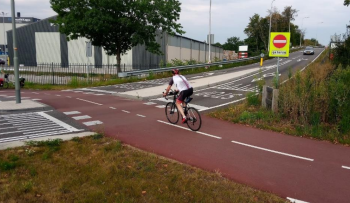
The UK shifts gear: Active Travel England launches to “boost cycling and walking”
The UK government has created a new agency specifically for cycling and walking, appointing former Olympic cyclist Chris Boardman as its interim commissioner. Active Travel England aims to boost walking and cycling levels by 50% by 2030.
The European Cyclists’ Federation (ECF) strongly welcomes the UK’s creation of its new cycling and walking executive agency, Active Travel England (ATE), and the appointment of Chris Boardman as its interim commissioner.
Together with the recent adjustments to the UK Highway Code that prioritise cyclists and the recent financial investments in cycling and infrastructure, this is a very clear demonstration of Great Britain’s commitment to become a cycling nation and to reap the benefits of a healthier population, cleaner air and safer roads.
A government agency dedicated to cycling
ATE will be tasked with improving standards for cycling and walking infrastructure and managing the national active travel budget, including awarding funding for projects that meet new national standards. The agency will also inspect finished projects, ensure they are delivered in line with expectations and publish reports on how highway authorities are performing on active travel. This includes identifying dangerous failings in the Highway Code for cyclists and pedestrians.
Chris Boardman is a strong choice as ATE’s interim commissioner, a role that will see him involved in setting up ATE and recruiting its chief executive and management team. Using his personal experience as a gold medal winning Olympic cyclist and British cycling champion, Boardman has become a prominent advocate for more cycling in the UK. In 2017, he was appointed Greater Manchester’s first Cycling and Walking Commissioner and, in that role, developed the “Bee Network plan,” intended to be the UK’s first joined-up cycling and walking network, delivering over 2,800 km of protected walking and cycling infrastructure. The ATE will be headquartered in York from summer 2022.
The resurgence of cycling in the UK
The creation of ATE and Chris Boardman’s appointment as interim commissioner are part of a flurry of recent actions and results putting the UK on the verge of becoming one of Europe’s great cycling nations.
A UK Department of Transport report from September 2021 found that more people are cycling for longer distances as a consequence of COVID-19 lockdowns. At the start of 2022, the department also revealed that the number of cyclists is surpassing the number of drivers on dozens of road networks, including on many A-roads (based on figures from 2020). Several road networks in London are also seeing the biggest jump in cyclists. Meanwhile, Transport for London announced this month that the Santander Cycles shared bike scheme had made over 10.9 million hires in 2021, smashing its previous record for most hires made in a year.
The UK government is also allocating £5.5 million new funding for local authorities, train operators and businesses to encourage the creation of more active travel schemes. This money will be used to boost e-cargo bike sharing schemes, improve cycling infrastructure around train stations and to explore active travel on prescription schemes. Furthermore, an update to the UK Highway Code to be enforced from 29 January puts pedestrians and cyclists in the top two places of the “hierarchy of road users,” meaning greater priority must be given to their safety and use of road space.
A strategic approach
To top this off, ECF’s new analysis of national cycling strategies shows that England is presently implementing a bold cycling strategy – of which the ATE creation is a part – that sets a goal of 50% of modal share being by bike or foot by 2030, with over £2 billion committed for investments in cycling to create a national cycling network, increase penalties for dangerous driving and improving the convergence of cycling and rail.
All of this is very promising for cycling in the UK. The creation of the ATE and the appointment of Chris Boardman as its interim commissioner, along with sustained financial investments, show there is clear political will to prominently increase cycling’s modal share in the UK’s transport network.
Kept on its present course, this will enable the UK to reap enormous benefits in the years to come, from a healthier and more economically productive population to less road congestion and deaths, and to a quicker attainment of its CO2 emissions reductions goals. ECF will continue watching progress unfold in the UK and encourages other European countries to seek inspiration from the UK’s actions for their own cycling strategies and plans.
Regions:
Contact the author
Recent news!
Contact Us
Avenue des Arts, 7-8
Postal address: Rue de la Charité, 22
1210 Brussels, Belgium









